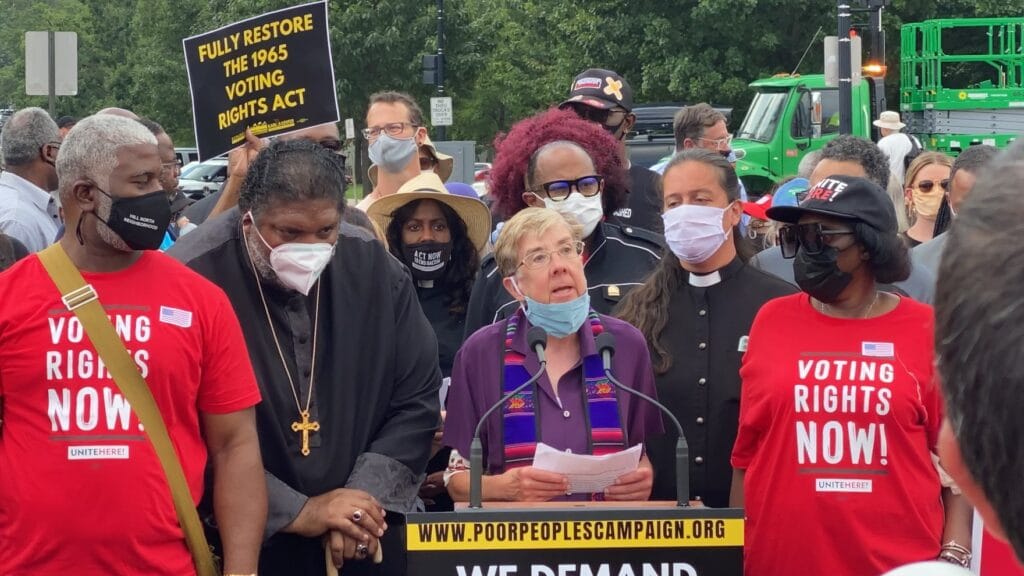Hundreds arrested in DC as Poor People’s Campaign presses for voting rights, $15 minimum wage
“When you lift from the bottom, everybody rises.”
With that message, the Poor People’s Campaign brought public pressure for change to Washington, D.C., on Monday.
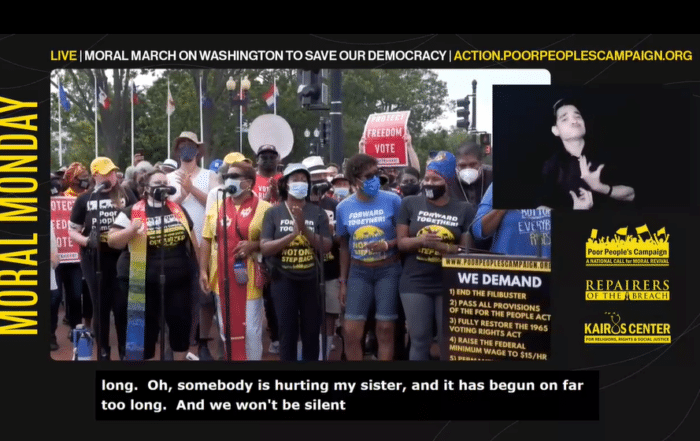
The peaceful protest for voting rights and a living wage resulted in scores of arrests.
More than 200 people – low-wage workers and faith leaders who walked with them – were charged with civil disobedience for blocking a street.
Sandy Sorensen, director of the United Church of Christ D.C. office, and the Rev. Jim Winkler, president of the National Council of Churches, joined the Rev. Jesse Jackson in police custody.
“I walked alongside a member of UniteHere, a union representing hospitality workers, who have been hit hard by the impact of COVID,” Sorensen said. “The march stretched for blocks and blocks and the visual was powerful and empowering.”
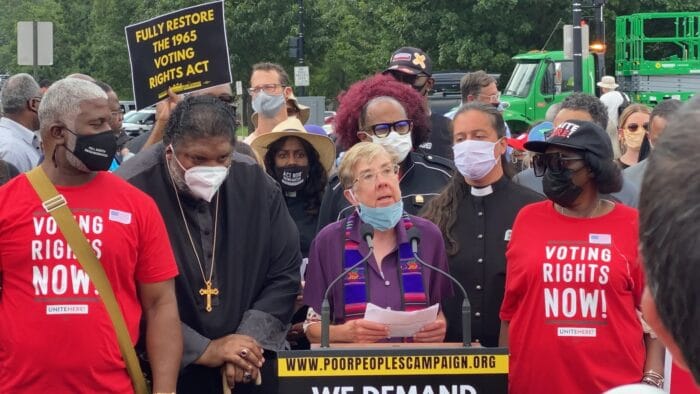
Four demands
The group had marched from Union Station to the Hart Senate Office Building on Constitution Avenue to defend democracy. They were delivering four demands to the U.S. Senate and the White House in a letter, which they are also encouraging the public to sign:
- End the filibuster.
- Pass all provisions of the For the People Act.
- Fully restore the Voting Rights Act of 1965.
- Raise the federal minimum wage to $15 per hour.
The Rev. William Barber, co-chair of the Poor People’s Campaign, verbally added permanent protections and respect for 11 million undocumented immigrants to the call for action.
“We are here today because we are compelled to be,” said the Rev. Liz Theoharis, the PPC’s other co-chair. “There comes a time when silence is betrayal. When the very foundations of justice and democracy are under attack, people must stand up.”
‘We cannot become complicit’
The Rev. Susie Smith, a retired UCC minister who traveled to D.C. from Greenville, S.C., was one of them. She was also arrested by Capitol Police.
“Rather than guarding the privilege of the few, Jesus of Nazareth and the great prophets of all faith traditions call upon us to share power, wealth and all the resources that have been entrusted to us,” Smith said.
“We still believe in the vision of a Beloved Community filled with justice, mercy and compassion for all. We marched on Monday to remind ourselves that we cannot become complicit with the increasing hostility, hatred, violence and division that tear at the fabric of our society.”
The Poor People’s Campaign is in the midst of a “season” of nonviolent direct action, urging lawmakers to represent all people, including Americans on the margins.
Thousands converged in D.C. from more than 40 states for the march from Union Station to the Capitol. The demonstration marked the week of the 56th anniversary of the signing of the 1965 Voting Rights Act.
‘You filibuster justice and mercy’
“America is in a moral crisis,” Barber said in his opening remarks. “We have found out in the last few weeks that Trump ain’t the only problem. He’s not over there anymore, his party is not in a majority anymore and folks still filibuster. We are finding out that it’s not just his lie … because if it was just his lie, things would be happening.
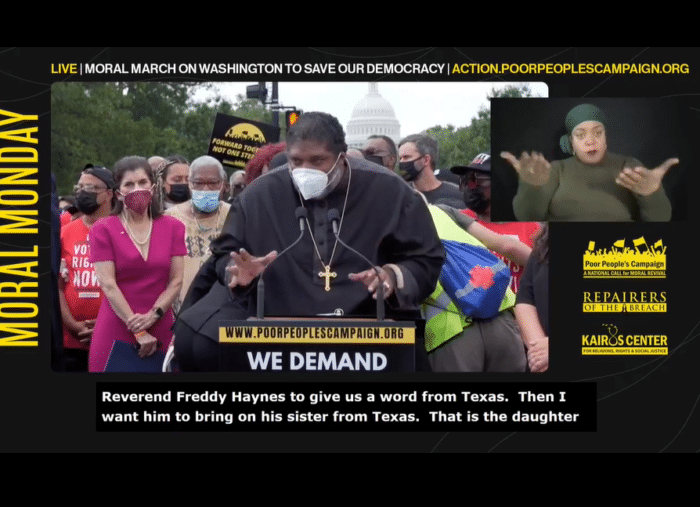
“This moment is exposing we have a moral crisis in this nation. In the Bible, Matthew 23 says woe to you teachers and hypocrites because you leave undone the matter of justice, mercy and faith. … You pay attention to the ‘rules’ of the house, but you filibuster justice and mercy.
“In the first pandemic response, 84-percent went to corporations. You know what that is – sin.
“The filibuster is sin. Leaving things undone is sin. Making essential workers save this country and not giving them a living wage is sin.
“In this moment the question is … Which side are you on, my people?” he said, speaking about lawmakers. “A non-constitutional filibuster or will you do your constitutional duty to ensure the general welfare of the people?”
Series of actions
The Monday demonstration was part of a month of “Moral Direct Action” that began July 12 with a mass call-in-day to U.S. Senators, and progressed to countrywide “Good Trouble Vigils for Democracy” on July 17, marking the one-year anniversary of the death of John Lewis.
On July 19, almost 100 people were arrested during a women’s march in D.C. just outside the Supreme Court. They gathered on the anniversary of the 1848 Seneca Falls Women’s Convention, the first women’s rights convention in the U.S. and a landmark moment in the women’s suffrage movement.
That was followed by 30 demonstrations at statehouses all across the country – sit-ins and marches – on July 26. Two days later, on July 28, people in Texas came together and marched 27 miles for democracy over four days, from Georgetown to Austin, culminating with a rally at near the statehouse.
Witness in Texas
The Rev. Ginny Brown Daniel, former UCC Missouri Mid-South Conference minister, served as a marshal in Texas that weekend, keeping the marchers distanced and safe from traffic. “As I live in Houston, I’ve been enraged by the measures the Texas governor is taking to enact voter-supression laws through the current special session. I knew in the marrow of my being I had to join.”
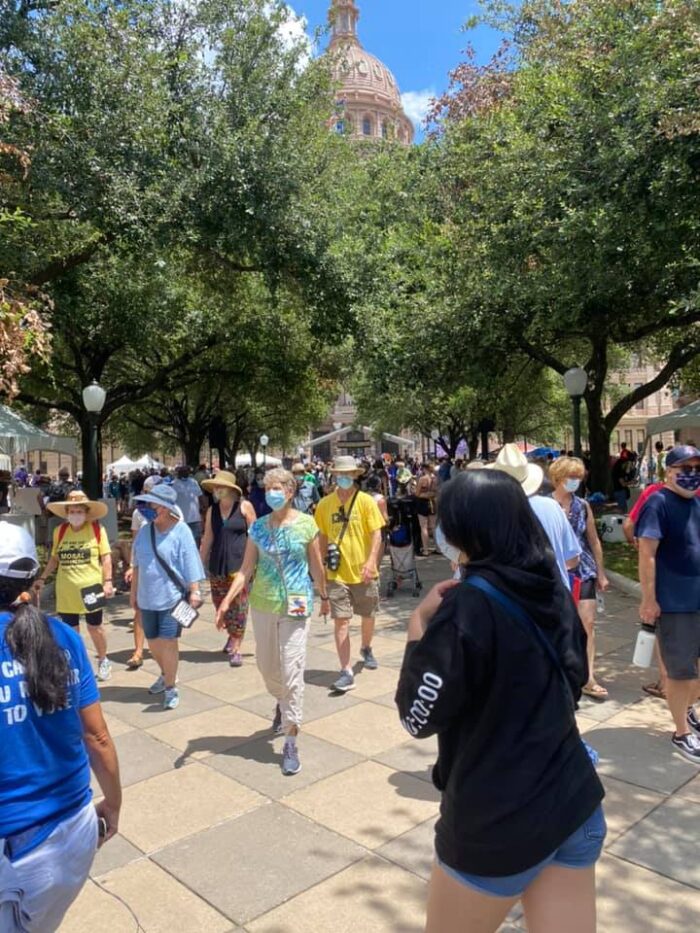
She also stood between advocates and extremists spewing hate.
“The minister in me feels closer to Micah’s charge to walk humbly with God because of our march together,” she said. “The Israelites walked for their freedom, Jesus walked with those whose backs were against the wall, Gandhi walked for the freedom of all in India, Dr. Martin Luther King walked for the freedom of African Americans and the Poor People’s Campaign walks for the freedom of those whose vote is so threatening it is under attack by white supremacists.”
Late president’s daughter speaks
On Monday in D.C., the late President Lyndon Johnson’s daughters, Luci Baines Johnson and Linda Johnson Robb, were in the crowd of witnesses.
“I want to say on behalf of generations of Johnsons, every one here matters to us,” Luci Johnson said. “You were there for my father in the great society … in 1964 with the civil rights bill and the 1965 Voting Rights Act and the 1968 Fair Housing Act, and without your support, it couldn’t have happened.”
She spoke about Jan. 8, 1964, and her father’s declaration of the war on poverty, when he said, “The richest nation on earth can afford to win it. We cannot afford to lose.”
‘Won’t take it anymore’
Many say the war on poverty has been lost because it still exists, Johnson said. But she cited programs like Medicare, Medicaid and Head Start that were created to combat it — and that also still exist.
“The war on poverty was not our enemy. Too many public policies have been. Too much inequity of income, access to jobs and education have robbed our people of a more just America. And we won’t take it anymore.
“Today we are in crisis. The vote gave Americans of all backgrounds the opportunity to address the inequities of our country. Those seeking to limit access to that vote will strangle liberty and justice for all.”
Johnson said both Democrats and Republicans stood up for social justice in the 1960s. “It was the right thing then, and it’s the right thing now.”
“Democracy doesn’t just happen, we have to fight for it,” Sorensen said. “It is unconscionable that we will be marking the anniversary of the Voting Rights Act, and we have fewer voting rights protections than we had in 1965.”
“Black and Brown people are the base of the party,” Jackson said. “We’re not the bottom. We’re the foundation. If we lose, they lose. If we lose, democracy loses. If we lose, Democrats lose. If we lose, the nation loses.”
“Our vote is our voice on critical issues like affordable housing, accessible health care, living wages, climate justice,” Sorensen said. “It is a critical time for action.”
Related News
A Prophetic Call for Justice and Peace in Palestine
The executive leaders of the United Church of Christ have issued the following statement...
Read More‘Love is Greater Than Fear’: Regional Youth Events get to the heart of gospel message
United Church of Christ teens attending this summer’s Regional Youth Events (RYE) are...
Read MoreUCC desk calendars available to order now
Prepare for your day, month and year with the United Church of Christ desk calendar —...
Read More